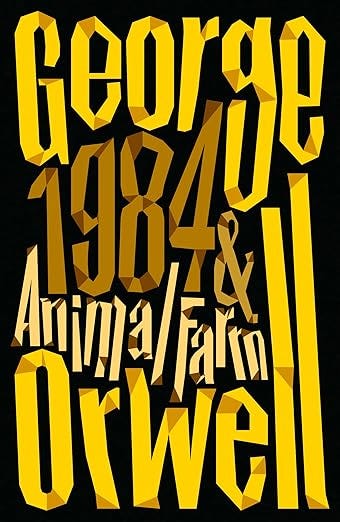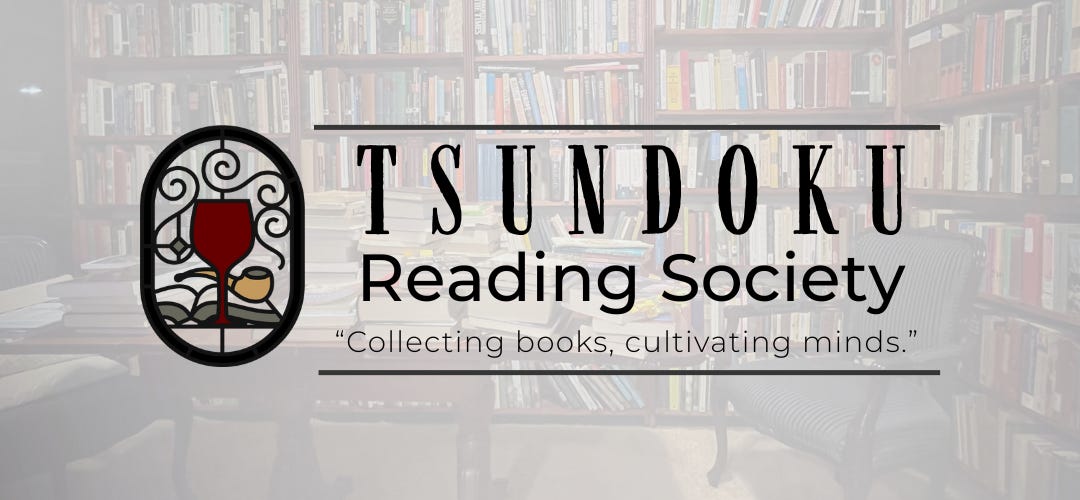A Dystopian July with Bradbury and Orwell
July Giveaway and Tsundoku Reading Society Meeting
July Giveaway
The July giveaway is two modern dystopian classics in one volume: Animal Farm & 1984 by George Orwell. Orwell’s 1984 and Animal Farm are searing political fables about truth, power, and rebellion. In 1984, Winston Smith rewrites history for Big Brother—until he dares to remember and resist. In Animal Farm, a revolt against tyranny gives way to a new, more insidious oppression. Orwell’s prophetic voice still resonates with us today.
To enter the drawing, simply become a paid subscriber at $7 per month or $60 per year. You’re not only eligible for the drawing but immediately made a member of the Tsundoku Reading Society. Plus, you gain access to the growing resource page (which includes recordings of the previous month’s book discussions, the BOOKS AND LETTERS podcast, and you get any of my print books steeply discounted (and in some cases free) whenever they become available.
Become a paid subscriber today.
The Tsundoku Reading Society
Monday, July 28th @ 4 pm PT /7 pm ET
The Tsundoku Reading Society is a community of thoughtful readers who gather online monthly to discuss the best of what has been thought and written because we thoroughly enjoy the crisp, clean sea breeze of the centuries blowing through our stifled modern minds. You don’t have to be a scholar to join the conversation. You just need a good internet connection, webcam, and mic paired with a spirit of wonder and a longing for that which is true, good, and beautiful.
If you’d like to join the Tsundoku Reading Society, simply become a paid subscriber at $7 per month or $60 per year. You’re then immediately eligible to attend the monthly discussions of the Tsundoku Reading Society, access the growing resource page (which includes recordings of the previous month’s discussion, listen to the BOOKS AND LETTERS podcast, and get print books free or steeply discounted when they become available.
Dystopian Literature
In 1516, Sir Thomas More, the English humanist and statesman whom Erasmus described as omnium horarum homo (“a man for all seasons”), published a little book he titled, Utopia. Something of a parody of Plato’s Republic, More presents a fictional society that is both attractive and disturbing at the same time. The book is a critical reflection on the social order of early modern Europe, particularly Tudor England. Borrowing from the Greek ou-topos (“nowhere”) he coined the expression, eu-topos (“good place”), inviting his readers to cultivate their moral imaginations by exploring better alternatives while simultaneously warning of ideological extremes.
Following More’s example, Jonathan Swift published his own popular, satirical social critique, Gulliver’s Travels, in 1726. Thus, a genre was born. Well, sort of. As it turns out, utopia and its opposite, dystopia, share a lot more in common that one might think. So, let’s define our terms. The Literary Encyclopedia defines a Utopia as
an imagined social order in which human flourishing has either been perfected or realised to an exceptionally high degree… A dystopia, by contrast, is a radically dysfunctional society in which the lives of the inhabitants are significantly impaired, damaged, or otherwise undesirable. Despite being defined as opposites, however, these two terms can be seen to stand in a complex, historically variable relationship to one another.1
Consider that the societies depicted in More’s and Swift’s stories, “while clearly utopian in some respects” are nevertheless “decidedly dystopian in others.” For instance, in More’s novel, slavery is foundational, an unchallenged element of utopian society. Meanwhile the state's pervasive control over its citizens—along with the fact that there is an utter absence of personal property or privacy—is comparable to the totalitarian regimes that emerged in the twentieth century—dystopia.
Where did the term “dystopia” derive? It was first recorded “in a speech addressed to the British House of Commons given in 1868,” in which
John Stuart Mill labelled the ministers of the incumbent Conservative government as ‘dys-topians, or caco-topians’ on account of their failed political and economic policies in Ireland. This remark was itself an allusion to the labelling of Mill and his parliamentary allies as “utopians” in previous debates for having proposed schemes for social improvement which were deemed impractical or idealistic. As in the case of More’s “utopia”, Mill’s “dystopia” and “cacotopia” were of Greek derivation: “dys” from the Greek “dus” meaning bad, diseased, or dysfunctional, and “caco” from the Greek “kakos” meaning wretched, hideous, or vile. “Cacotopia” fell rapidly into disuse…[and] within thirty years of Mill’s speech, “dystopia” had begun to appear, albeit infrequently, in books and periodicals.2
By the twentieth century, while perhaps not quite commonplace, “dystopia” was certainly part of the public’s vocabulary. Consider a few of the popular literary titles, both fiction and non-fiction, which engaged the overlapping themes of or used the expression, dystopia:
Franz Kafka’s “In the Penal Colony” (1919), The Trial (1925), and The Castle (1926)
Andrei Platonov’s The Foundation Pit (1930)
Aldous Huxley’s Brave New World (1932)
Arthur Koestler’s Darkness at Noon (1940)
Karl Popper’s The Open Society and its Enemies (1945)
George Orwell’s novella Animal Farm (1945) and Nineteen Eighty-Four (1949)
Hannah Arendt’s The Origins of Totalitarianism (1951)
Aleksandr Solzhenitsyn’s The Gulag Archipelago (1973–1976)
In more contemporary times, some well-known dystopian novels include:
Ray Bradbury’s Fahrenheit 451 (1953)
Margaret Atwood’s The Handmaid’s Tale (1985)
Anthony Burgess’s A Clockwork Orange (1962)
Cormac McCarthy – The Road (2006)
Suzanne Collins – The Hunger Games (2008)
James Dashner – The Maze Runner (2009)
Ling Ma – Severance (2018)
Reading dystopian literature is not what many would consider “joyful reading.” But it is most certainly enlightening reading. In a real sense, dystopian literature is cathartic in a similar way that Greek tragedy is cathartic, evoking fear and pity. Dystopian stories cultivate our moral imaginations by inviting to explore our current society in light of the one presented in the story. We are thus prompted to consider better alternatives while simultaneously being warned of human proclivity toward ideological extremes.
For the month of July (the month our national anniversary), I’m inviting you to join me in reading the dystopian short story, The Pedestrian, by Ray Bradbury. It is, by far, one of the shortest stories you’ll ever read—except perhaps the one often attributed to Ernest Hemingway: “Baby shoes for sale. Never worn.”
You can download it below and we’ll meet to discuss it on Monday, July 28th at 4:00 pm PT / 7 pm ET (the meeting is about 60-90 minutes).
Steps to Follow
Download the short story; read it; mark it up; ask questions of the text. Then, watch your inbox for login instructions to join the Zoom meeting on Monday, July 28th at 4:00 pm PT (7:00 pm ET). It’s that simple.
Got questions? email me@scottpostma.net.
Seeger, Sean. "Dystopia and Dystopian Literature". The Literary Encyclopedia. First published 21 May 2018 [https://www.litencyc.com/php/stopics.php?rec=true&UID=19513, accessed 04 July 2025.]
Ibid.





